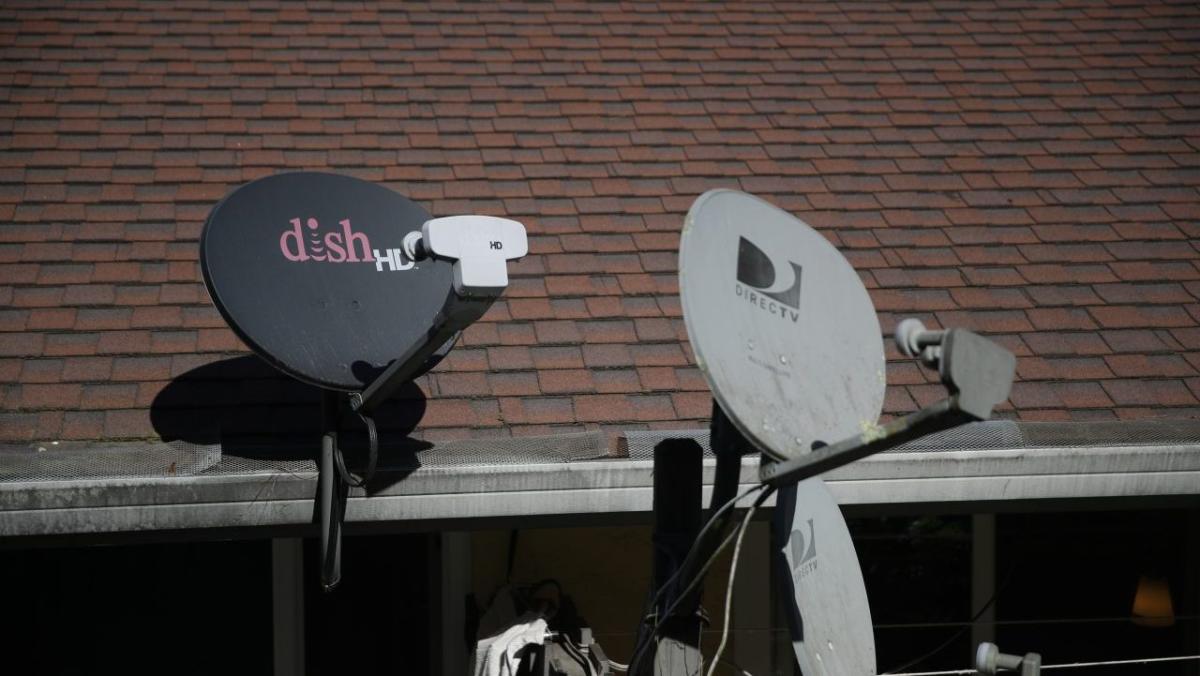The acquisition of Dish Network would make DirecTV the largest pay-TV operator in the U.S. by far, but the consolidation of the rival satellite services isn’t likely to do much to decelerate the disintegration of the legacy distribution model.
Per terms of a deal that was announced Monday morning, DirecTV agrees to pay a single dollar ($1) for EchoStar’s satellite unit, a nominal sum that will be offset by the assumption of $9.75 billion in Dish’s debt. Pending regulatory approval, the deal is expected to close in the second half of 2025.
While the two companies first proposed a merger in 2002, the plan was shot down by the FCC and DOJ, which cited concerns about a resulting monopoly in the DBS (direct broadcast satellite) space. At the time, the government estimated that DirecTV and Dish boasted a combined reach of 18.6 million subscribers; excluding the contributions of the vMVPD platforms Sling TV and DirecTV Stream, 13.2 million households currently subscribe to the core satellite-TV products.
Given a consistent annual 15% churn rate, the number of households that subscribe to one of the two legacy DBS services could be whittled down to just 11.2 million by the time the deal closes. As such, the prospect of a merger is no longer tainted by the sort of antitrust concerns that derailed the first attempt 22 years ago.
Rather than posing a threat to the free market, a DirecTV-Dish tie-up may only serve to kick the can down the road a bit. DirecTV, which has lost 1.55 million DBS subs in the last year alone, inherits an aging satellite fleet that will allow for few synergies on the video-distribution front. Dish’s scrambling technology is incompatible with DirecTV’s own orbital tech, which effectively means that a Dish set-top box cannot communicate with a DirecTV satellite. That’s particularly unfortunate, as the cost of swapping out all those Dish boxes post-merger would be astronomical.
On the other hand, EchoStar’s bid to exit the pay-TV racket will free it of nearly half its debt load, while allowing the company to focus instead on its 5G wireless network. More immediately, Dish will receive funds to help pay off a $1.98 billion bond that’s coming due in mid-November. Last month, EchoStar chief financial officer Paul Orban told investors the company did not have sufficient cash on hand to fund its fourth-quarter operations; as of June 30, Dish’s parent company had $521 million in cash and cash equivalents in the hopper.
In a recent note to investors, MoffettNathanson analyst Craig Moffett made it clear he believes the proposal to consolidate the two companies is the only thing standing between them and insolvency. “It’s hard to imagine that regulators would block a deal,” he wrote. “Better to have one [DBS operator] than none.”
Still, as much as a merger should keep the wolf from the door for a while, Moffett’s long-term outlook for the DBS business remains grim. “It would be a mistake to overestimate [the deal’s] importance,” he wrote. “Adding a year or so to the expected life of satellite TV isn’t going to change the narrative for programmers, distributors, or even for satellite TV.”
All told, the two satellite carriers have lost 5.48 million subscribers since the second quarter of 2022. DirecTV’s sub base is contracting at an annual rate of -19%, while Dish is losing ground at a 12% clip. On the cable front, operators are losing about a tenth of their bundled base each year; all told, the traditional bundle sank to 49.8 million homes at the end of June, which marks a 42% erasure in the last five years. Once in nearly 90% of all U.S. TV homes, the bundle’s penetration has been reduced to 40%.
Predictably, the steady erosion of the bundle has led to a rapid decline in overall TV usage. In the last five years, U.S. HUT levels (industry argot for “Homes Using Television) have fallen 36%, while the impact on younger adults has been all but catastrophic. Per Nielsen, TV usage among adults 18-34 has plummeted 68% since 2019.
If a DirecTV-Dish deal had been viable even just a few years ago, the results may have helped boost the fortunes of the similarly troubled regional sports networks space. Two years after Dish founder and former CEO Charlie Ergen said he wasn’t interested in renewing the company’s expired carriage deal with Diamond Sports, Dish dropped its final RSN (NESN) at the end of 2021. DirecTV, for its part, is famously RSN-friendly, and re-upped with Diamond in the spring.
Separately, the private equity firm TPG, which owns 30% of DirecTV, said it will acquire the remaining stake from AT&T for $7.6 billion. TPG said its transaction is not contingent on the successful realization of the DirecTV-Dish deal.
“With greater scale, we expect a combined DirecTV and Dish will be better able to work with programmers to realize our vision for the future of TV, which is to aggregate, curate, and distribute content tailored to customers’ interests,” DirecTV CEO Bill Morrow in a statement released Monday. Morrow went on to say that the merger would serve to “realize operating efficiencies, while creating value for customers through additional investment.”
More from Sportico.com
Best of Sportico.com
Sign up for Sportico’s Newsletter. For the latest news, follow us on Facebook, Twitter, and Instagram.
